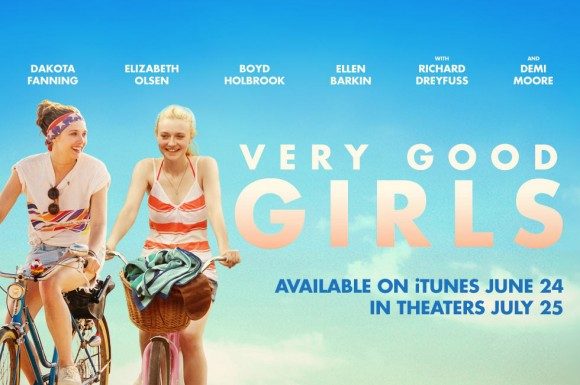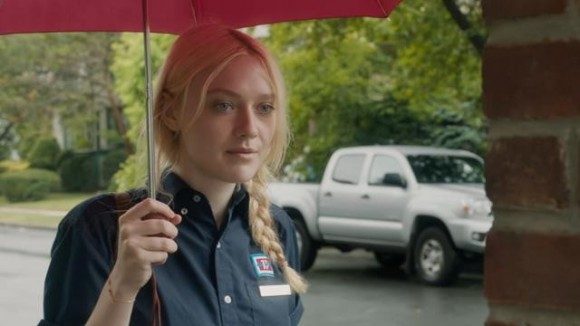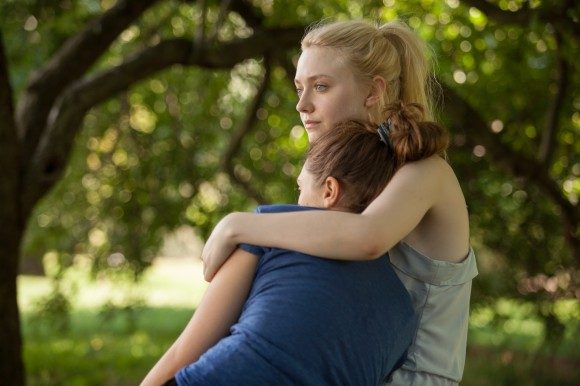Directorial debuts are always faced with a unique kind of scrutiny, whether it’s with leniency for a first-time filmmaker, or with expectation for a veteran writer or actor finally stepping behind the camera. Very Good Girls marks Naomi Foner’s first film after more than 40 years as a writer and producer. Having written just six films, her filmography is by no means extensive, but it does present a certain pedigree, thanks primarily to her Oscar nominated screenplay Running On Empty, the 1988 River Phoenix film. Foner’s lengthy, and evidently selective, career has helped her rope together a dynamite cast of talent. It’s all the talent both behind and in front of the camera that elevates Very Good Girls from an unremarkable indie wisp, to a uniquely disappointing film.
The film follows Lilly (Dakota Fanning) and Gerry (Elizabeth Olsen), two New York natives who make a pact to lose their virginity before they go to college. Lilly’s straight-laced home life is pulled off kilter when her mother (Ellen Barkin) discovers Lilly’s father (Clark Gregg) having an affair. Meanwhile, Gerry’s hippy parents, played by Demi Moore and Richard Dreyfuss, exist primarily to tease Gerry about her virginity and provide bits of witticism. Lilly and Gerry’s friendship begins to fray when they both fall for a street artist named David (Boyd Holbrook), who takes a shine to Lilly. There’s also a small subplot about Lilly’s pervy boss (Peter Sarsgaard), which serves no point whatsoever.
Very Good Girls doesn’t feel like a film that was written by a 68 year-old Oscar nominated screenwriter. It feels like a film powered by a 17 year-old’s naïve sense of romance and a wince-inducing desire to sound cool. Even worse, the film so persistently refuses to build narrative tension that I can only assume it was intentional. That’s not to say there isn’t conflict, because the film has an over-abundance of that. But movies aren’t really about conflict, they’re about what the conflict drives characters to do, and in this film, that means precious little. This leaves the whole experience with precious little narrative weight. The separation of Lilly’s parents in particular feels like one giant missed opportunity, providing no substance other than allowing Clark Gregg to deliver a heftily scripted monolog about love and forgiveness.
In fact, the fulcrum around which the entire film pivots is the death of a character that comes so out of left field, I thought that the film had skipped fifteen minutes. It’s a moment that is so clearly there just to push the plot along that any sense of tragedy meant to echo through the film’s final act feels forced and cheap. But at least it does finally start pushing characters towards emotional development. Unfortunately their plotlines have already been worn out by decades of cliché and overuse.
Very Good Girls fails on a narrative level, but more disappointingly, it fails on a character level as well. No one in the film feels like a real person. They feel like characters clipped out of magazines. Lilly’s the straight-laced girl heading off to Yale in the fall. Gerry is the young artist from a more bohemian family focusing on her music. Then there’s heartthrob David, the struggling street photographer who lives in a loft above a photography studio and dreams of traveling to Paris with nothing but the clothes on his back, and the $7,000 Leica camera he can somehow afford on his ice cream vendor wages. That’s not a person; that’s a piece of fan fiction. Every attempt to make David feel edgy, unique, or artistic falls painfully flat. Whether he’s sculpting images of breakfast food into the sand, or asking Lilly to read Sylvia Plath poems before taking her to bed, it all comes off as parody instead of sincerity.
Treading water in this sea of pubescent tumult, the actors primarily turn in respectable performances. Dakota Fanning flexes her acting chops, carrying the majority of the film on her back. Despite looking far too old to play 18, Elizabeth Olson squeezes ever drop of charisma out of what little she is given. In a film about their friendship, the two share a surprisingly small amount of screen time, but make the most out of what they have. The supporting cast turns in serviceable performances, but most can’t quite pull their pathetically flat characters into three dimensions.
Verdict: 2 out of 5
There are films that are disappointing, and there are films that are disappointing just because you expect more from the talent involved. Very Good Girls is both, and the fault rests squarely with Naomi Foner, who writes and directs. After nearly half a century in the business, Foner has assembled something akin to a film school thesis, albeit with a more illustrious cast. The performances are admirable, but even the best sailors can’t cross an ocean in a boat made of paper mache.




